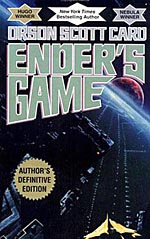
![]() couchtomoon
couchtomoon
8/11/2013
![]()
A surprising turn of events: Having read this before I knew anything about the author and his disagreeable beliefs, I thought Ender's Game was okay, but too depressing for my taste (I've grown, okay?), and found the uncertain audience focus distracting (is it for kids or adults?). Upon reread, now aware of Card's unapologetic homophobia among other things, I expected to have a stronger dislike for this novel, vigilantly aware of narrative prejudices and the like. Not the case. As YA, it's a pleasurable read, with challenging, surprising, and ambiguous concepts open to a variety of interpretations.
Characterizations of precocious children are often flawed, and Ender's Game is nothing new in that regard. Card handles giftedness as a thematic polish, always in service to the plot, not reality, essentially putting adult people into little bodies in order to watch them squirm and adapt to their restricted freedoms. This hyperbole works, however, when Ender takes on the Ubermensch role, not to demonstrate Ender's endless tolerance for sadism, but in order to demonstrate the threat of hegemonic power to "useful" citizens, its endless appetite for means to ends. On the other hand, it could be interpreted as a pity party for the exceptionals (aww, the dumb, impoverished normals have it so good), but overall, the most impressive quality of EG is its permeating moody tone and effortless ability to foster empathy for these little kid characters. In some ways, it feels like a childhood version of The Forever War, prompting comparison and speculation as to whether EG would have been as successful with adult characters. (Probably not; kid empathy comes preloaded, which is why so many readers and writers are drawn to children's fiction in the first place, whether they are conscious of it or not.)
Objectionable details are present: locker room homophobia, Jewish slurs (amid Muslim tolerance, no less! The eighties are so far away from today...), and rampant social darwinism will grate modern progressive sensibilities, but a variety of nuanced political and social viewpoints present themselves, while the haunting conclusion makes Card's personal designs less than clear... which is a good thing.
http://couchtomoon.wordpress.com